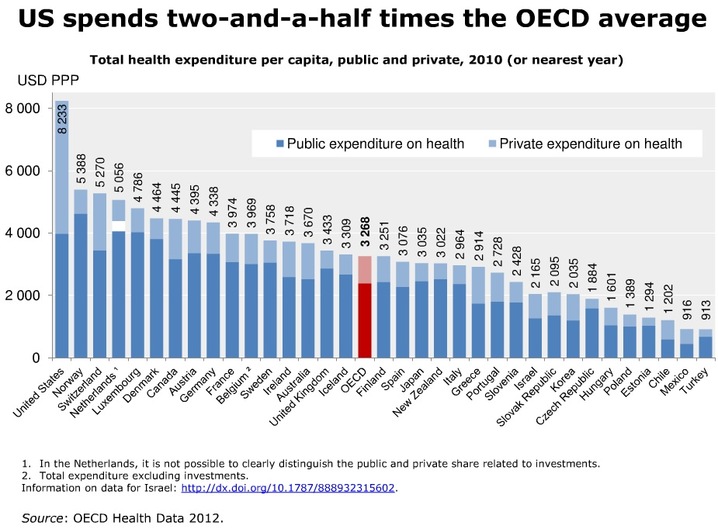U.S. health care costs grew by 3.9% in 2011 (as it did from 2009-10), which looks pretty modest compared to the average 6.8% increases of the last decade. But keep in mind that the total U.S. health care was $2.7 trillion in 2011 — far more than any other country in the world, and equivalent to nearly 18% of our entire economy, or $8,680 for every man, woman and child living here. Here’s how we stack up compared to other nations:

2010 health expenditures by country per capita. (Data collected by the OCED, an international economic development group.)
Since 2002, American health care premiums have increased 97% — three times faster than either wages or inflation. If Americans had better health outcomes than anywhere else in the world, maybe that could be (partially) justified. But that’s not the case. In fact, the U.S. ranked dead last in a 2010 study comparing our health care to Australia, Canada, Germany, the Netherlands, New Zealand, and the United Kingdom.
So why, after a decade of steep increases, is spending slowing down? According to a recent AP story, one possibility is a shift to high-deductible plans that discourage preventive care – meaning fewer people going to the doctor – and another is simply a weak economy. But it seems plausible since Obamacare now requires insurers to publicly justify certain rate increases, it’s become harder to do so:
By requiring insurance companies to further document, submit for review, and publicly justify rate increases above a certain level, consumers are able to better understand their premiums and shop for health insurance.
Obamacare also requires health insurance companies to spend 80% of premium dollars directly on health care delivery – and limits them to 20% for administration, salaries, advertising, etc. These cost controls are also likely having an impact on out-of-control cost growth. Whether that’s sufficient to eventually bring health care costs into alignment with the economy remains to be seen.
More To Read
May 19, 2025
A year of reflections, a path forward
Read EOI Executive Director's 2025 Changemaker Dinner speech
March 24, 2025
Remembering former Washington State House Speaker Frank Chopp
Rep. Chopp was Washington state’s longest-serving Speaker of the House
February 11, 2025
The rising cost of health care is unsustainable and out of control
We have solutions that put people over profits
